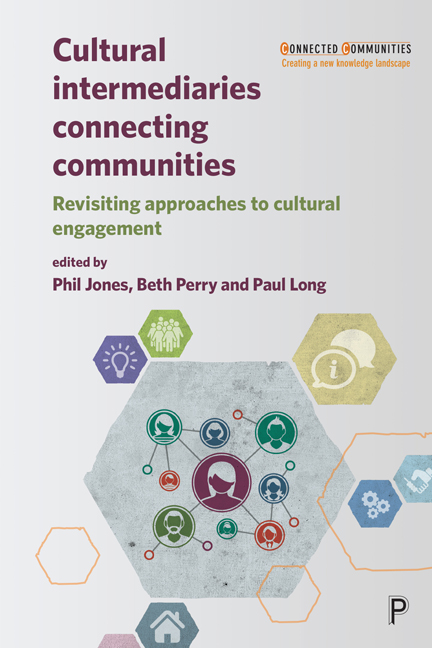Book contents
- Frontmatter
- Contents
- List of figures, tables and boxes
- Notes on contributors
- Acknowledgements
- Series editors’ foreword
- Introduction: Bringing communities and culture together
- Part One Changing contexts
- Part Two Practices of cultural intermediation
- Part Three Evaluation, impact and methodology
- Conclusion: where next for cultural intermediation?
- Index
fifteen - From the inside: reflections on cultural intermediation
Published online by Cambridge University Press: 30 April 2022
- Frontmatter
- Contents
- List of figures, tables and boxes
- Notes on contributors
- Acknowledgements
- Series editors’ foreword
- Introduction: Bringing communities and culture together
- Part One Changing contexts
- Part Two Practices of cultural intermediation
- Part Three Evaluation, impact and methodology
- Conclusion: where next for cultural intermediation?
- Index
Summary
Introduction
Founded in 2010, Assemble is a London-based architectural collective. In 2015 it originated the Granby four streets project in Liverpool based around the renovation of a series of houses and empty shops. The project enlisted local people by offering them training and building jobs and included the creation of a workshop selling home goods created in collaboration with local craftmakers and artists. To the surprise of many, not least all the members of Assemble themselves, the project was awarded that year's prestigious Turner Prize for art. As Rosamund (2016: 119) relates, this award provided recognition of an uncomfortable sort ‘as if to wave a magic wand that turns “projects” into “art”’. The result of nomination by a curator, she suggests how this bestowal manifests the conflicting nature of relations between the professional field of art with works expressing social objectives. While practices such as that of Assemble are a riposte to familiar expectations of creative work and the special status of the creator, the award evinces the art world's ‘appetite for outsiders, for impact, for the look and feel of social engagement’ (Rosamund, 2016: 119).
The nature and recognition of Assemble is a signal moment on a long trajectory of social engagement and cultural intermediation that, most of the time, has merited little attention of this kind from an art world of markets and celebrity artists. Whether art or not, the conception of Granby four streets and its relationship with the local environment, culture and community in which it was located resonates with contexts and projects described across previous chapters which also speak to a wider field of intermediation. As detailed by Long and Warren (see Chapter five in this volume) and Symons (Chapter thirteen), activity in Balsall Heath and Ordsall evidences the range of ways in which cultural projects might be conceived when originated among communities themselves. At the periphery of a cultural sector, let alone the creative industries, they challenge traditional expectations and parameters determining the nature of ‘art’ and indeed the role of the intermediary.
The moment of Assemble is a prompt for the contribution of this chapter, which draws upon the author's personal experience gained in a career as an arts practitioner, between the production of performance and other forms of production as well as policy formulation and analysis.
- Type
- Chapter
- Information
- Cultural Intermediaries Connecting CommunitiesRevisiting Approaches to Cultural Engagement, pp. 207 - 220Publisher: Bristol University PressPrint publication year: 2019



